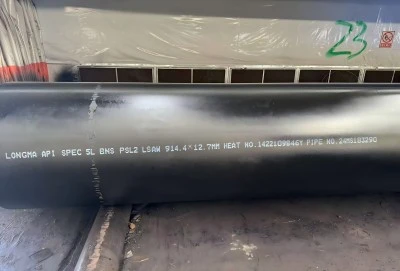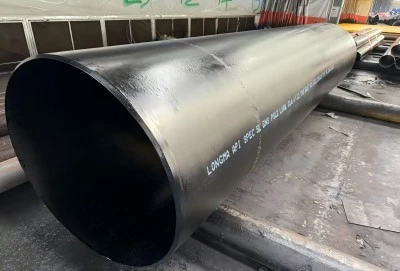LSAW (Longitudinal Submerged Arc Welded) steel pipes are crucial components in various industrial applications, particularly in oil and gas transportation systems. These pipes are manufactured through specialized forming processes that ensure high quality, reliability, and structural integrity. Understanding the forming methods and characteristics of LSAW steel pipes is essential for engineers, contractors, and industry professionals involved in pipeline projects.
The manufacturing of LSAW steel pipes involves sophisticated technologies and precise quality control measures. These pipes are produced by welding steel plates longitudinally, creating a strong and durable seam that can withstand high pressures and challenging operating conditions. The forming process is critical in determining the final properties and performance of the pipe.
|
|
|
Forming Method
The forming method significantly influences the quality and characteristics of LSAW steel pipes. Two primary forming methods have emerged as industry standards, each with its unique advantages and applications. These methods have been refined over decades of technological advancement and practical experience in pipe manufacturing.
1.UOE (Uing and Oing) forming method:
The UOE forming process represents a traditional and well-established method for manufacturing LSAW steel pipes. This method involves a series of carefully controlled steps that transform flat steel plates into cylindrical pipes. The process begins with edge preparation, where the steel plate edges are beveled to ensure proper welding conditions.
During the pre-bending stage, the edges of the steel plate are crimped to facilitate the subsequent forming steps. This initial deformation helps achieve the desired circular shape while minimizing stress concentrations. The pre-bending operation typically utilizes specialized machinery that can apply precise force and maintain consistent bending angles.
The U-ing stage involves forming the plate into a U-shape using a powerful U-press. This equipment applies uniform pressure across the plate width, creating a consistent U-profile. The accuracy of this step is crucial as it affects the final pipe roundness and diameter consistency.
In the O-ing stage, the U-shaped section is further formed into a circular shape using an O-press. This equipment applies circumferential pressure to achieve the final round shape. The process must be carefully controlled to maintain dimensional accuracy and avoid ovalization.
After the O-ing stage, the pipe undergoes expansion (E-ing) using an internal expander. This step helps achieve precise diameter specifications and improves the pipe's roundness. The expansion process also helps reduce residual stresses from previous forming operations.
2.JCOE (J-ing, C-ing, O-ing, and E-ing) forming method:
The JCOE forming method represents an advanced approach to LSAW pipe manufacturing. This process introduces additional forming steps that provide better control over the final pipe properties. The progressive nature of JCOE forming allows for more uniform deformation and reduced residual stresses.
During J-ing, the steel plate is initially formed into a J-shape using specialized equipment. This step provides better control over the forming process compared to direct U-forming. The gradual deformation helps maintain material properties and reduces the risk of surface defects.
The C-ing stage transforms the J-shape into a C-profile through controlled bending operations. This intermediate step allows for better distribution of forming forces and helps achieve more uniform wall thickness. The C-ing process is particularly beneficial when producing thick-walled pipes.
The subsequent O-ing and E-ing stages complete the forming process, similar to the UOE method. However, the progressive deformation achieved through J-ing and C-ing typically results in better dimensional control and reduced residual stresses. This advantage makes JCOE forming particularly suitable for producing high-grade pipes with demanding specifications.
Characteristics
LSAW steel pipes manufactured through these forming methods exhibit several distinctive characteristics that make them suitable for demanding applications. These properties are the result of careful material selection, precise forming operations, and rigorous quality control measures.
The ability to produce large-diameter pipes is a significant advantage of LSAW manufacturing methods. These pipes can be produced with diameters ranging from 16 inches to 120 inches, making them suitable for major pipeline projects. The large diameter capability allows for efficient fluid transportation and meets the requirements of various industrial applications.
Thick wall construction represents another crucial characteristic of LSAW steel pipes. The forming methods can accommodate wall thicknesses ranging from 6mm to 40mm or more, depending on the application requirements. The thick wall construction provides excellent pressure containment capabilities and mechanical strength.
The combination of high-quality steel plates and precise forming operations results in superior pressure resistance. LSAW pipes can withstand operating pressures exceeding 1500 psi, making them ideal for high-pressure transmission systems. The longitudinal weld seam, when properly executed, maintains strength equivalent to the base material.
Low-temperature performance is particularly important in many applications. LSAW pipes can be manufactured using steel grades specifically designed for low-temperature service. The forming methods preserve the material's low-temperature toughness, ensuring reliable performance in cold environments.
Multiple Inspections and Tests
Quality assurance for LSAW steel pipes involves comprehensive inspection and testing protocols. These measures ensure that the pipes meet specified requirements and maintain consistent performance throughout their service life. The inspection process begins with raw material verification and continues through various stages of manufacturing.
Chemical composition analysis verifies that the steel material meets the required specifications. This analysis typically includes evaluation of carbon, manganese, silicon, and other alloying elements. The chemical composition directly influences the pipe's mechanical properties and weldability.
Mechanical property testing encompasses various evaluations, including tensile testing, yield strength determination, and elongation measurements. These tests confirm that the pipe material maintains its strength and ductility after the forming process. The results must comply with applicable standards and project specifications.
Drop Weight Tear (DWT) testing assesses the material's resistance to brittle fracture. This test is particularly important for pipes operating at low temperatures or in critical applications. The results help ensure that the pipe maintains adequate toughness under service conditions.
Impact testing, typically performed using Charpy V-notch specimens, provides additional information about material toughness. The tests are conducted at specified temperatures to verify low-temperature performance capabilities. Results must meet minimum energy absorption requirements.
Non-destructive examination methods, including radiographic testing and ultrasonic inspection, verify weld quality and material integrity. These techniques can detect internal defects, lack of fusion, and other anomalies that might affect pipe performance. The entire weld length undergoes 100% inspection to ensure consistency.
China Wholesale API 5L LSAW Steel Pipe Manufacturers
The selection of a reliable LSAW steel pipe manufacturer is crucial for project success. Manufacturers must demonstrate consistent quality, technical capability, and compliance with international standards. Professional manufacturers maintain comprehensive quality management systems and possess relevant certifications.
LONGMA GROUP has established itself as a prominent manufacturer of LSAW steel pipes. Their manufacturing facilities incorporate modern equipment and advanced quality control systems. The company maintains certification to multiple international standards, including API 5L, ASTM A53, ASTM A500, ASTM A252, and ASTM A795.
The production capabilities encompass a wide range of pipe specifications, enabling them to meet diverse project requirements. Their quality management system ensures consistent product quality through systematic control of manufacturing processes. The company provides comprehensive technical support and documentation to facilitate project execution.
When selecting wholesale API 5L LSAW steel pipe manufacturers, buyers should consider factors such as production capacity, quality certifications, and technical support capabilities. LONGMA GROUP welcomes inquiries at info@longma-group.com for detailed information about their products and services.














